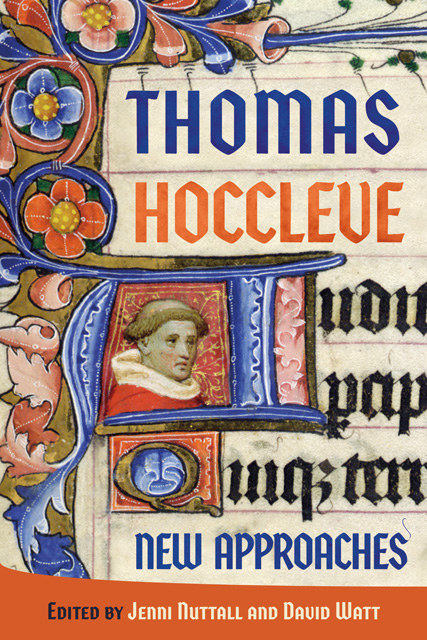1 - Historicising Hoccleve’s Metre
Published online by Cambridge University Press: 11 January 2023
Summary
Since Frederick Furnivall edited Thomas Hoccleve’s poems for the Early English Text Society in the final decade of the nineteenth century, historians of English metre have struggled to make sense of the poet’s idiosyncratic repertoire of rhythms. For seven or eight lines at a time, the metre may scan identically to that of John Gower or Geoffrey Chaucer, with five offbeats strictly alternating with five beats to a count of ten syllables. That metre may then seem abruptly to abandon its template and briefly adopt something akin to the verse principles of Pearl or Piers Plowman only to shapeshift again to resemble nothing whatsoever in literature, English or otherwise. What logic one gleans from the metre can appear clumsy and haphazard, leaving an impression less of an organised system than a riddle of contradictory cues. Hoccleve’s penchant for rhythms that both invoke and refuse comparison with other accentual-syllabic prosodies of the late fourteenth and early fifteenth centuries has long posed a unique problem: because Hoccleve’s metre cannot persuasively be reconciled with any known metrical system, it must be allowed its own category. It is simply too much itself to be anything else. And yet that metre also seems to be too much of everything else to observe internally consistent verse principles or surpass mere pastiche. How then to proceed with a description of that metre when it offers both too little and too much?
One may reasonably reply that such a question fails to identify relative to what or whom Hoccleve’s metre offers ‘too little’ or ‘too much’. Is the metre primarily a species of Chaucer’s decasyllable? Of Machaut’s vers de dix? Of Marlowe’s pentameter? As this essay will argue, the problem of describing Hoccleve’s metre is in fact an epiphenomenon of neglecting properly to historicise that metre and contextualise it within its own aesthetic and material moment. Much of the confusion surrounding Hoccleve’s metrical line issues not from the internal complexity of the line itself (complex though it is) but rather from diachronic narratives imposed on the metre anachronistically that situate it exclusively in positivist taxonomies that read Chaucer, for instance, as an antitype to all later types and late medieval English decasyllabic verse as prototypical pentameter.
- Type
- Chapter
- Information
- Thomas Hoccleve New Approaches , pp. 25 - 46Publisher: Boydell & BrewerPrint publication year: 2022



